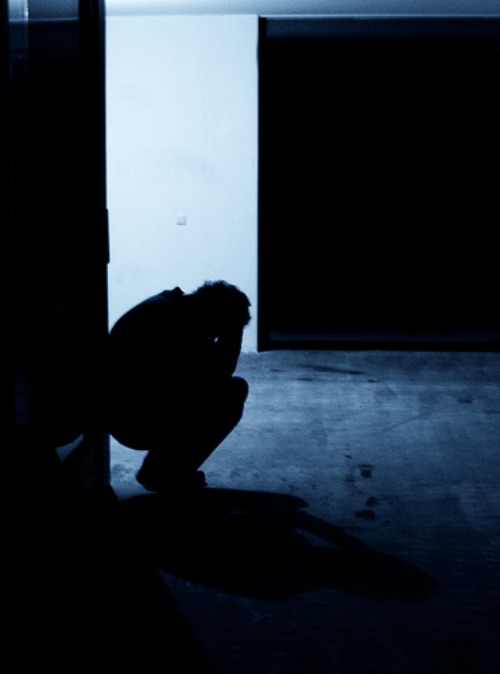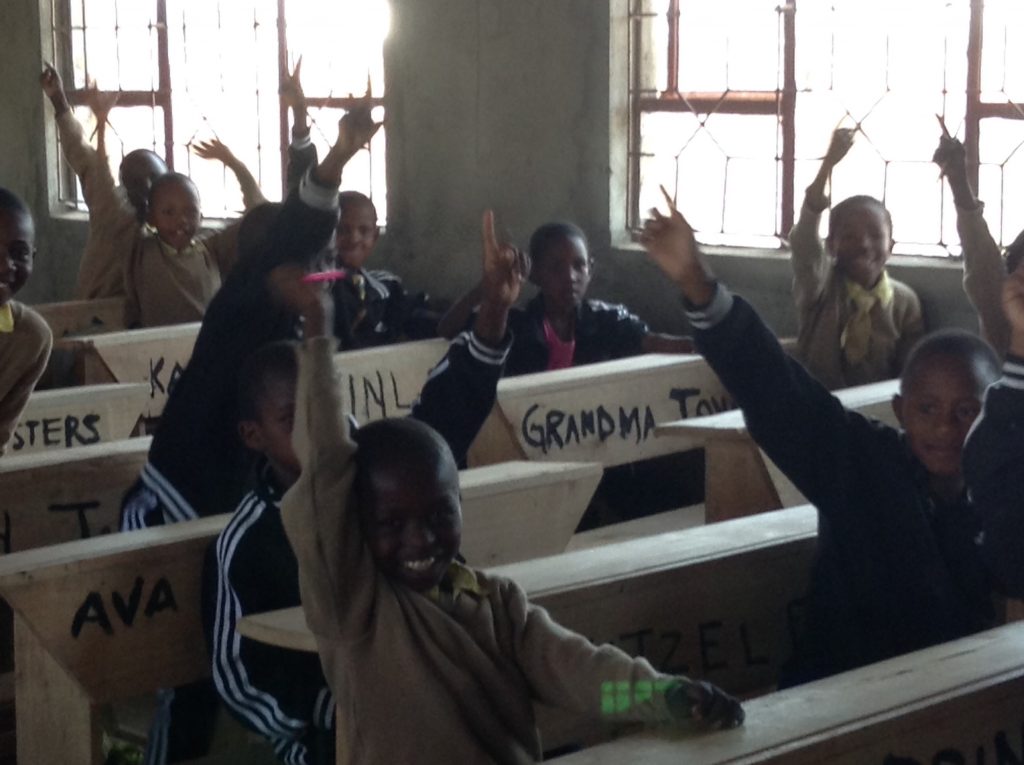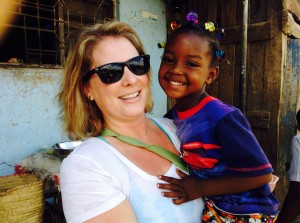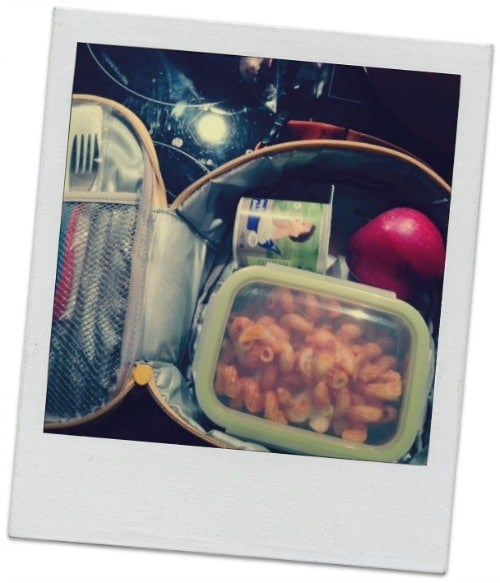
by Kirsten Doyle (Canada) | Jan 28, 2014 | Awareness, Canada, Mental Health, Mental Illness
 When I was a teenager, I suffered from teen depression. When I tried to talk to someone about it, I was told to “pull myself together”. I didn’t mention it again, because I didn’t think it was OK to talk about it.
When I was a teenager, I suffered from teen depression. When I tried to talk to someone about it, I was told to “pull myself together”. I didn’t mention it again, because I didn’t think it was OK to talk about it.
When I was in my early 20’s, my life fell apart. I managed to pick up the pieces, but I also picked up anxiety, PTSD and an eating disorder to go along with the depression. I didn’t talk about it, because I felt that my own bad decisions had led to the state I was in. In other words, it was my own fault, therefore I didn’t deserve to be helped.
After the birth of my second child, I found myself drowning in postpartum depression. I didn’t talk about that either, because I was so ashamed. How could I possibly be feeling so bleak – suicidal, even – when I had two beautiful children? What kind of horrible person was I, that I would even think about leaving my sons without a mother?
For pretty much all of my teen and adult life, I have dealt with mental health problems that I haven’t wanted to talk about. I struggled alone with the fallout from the crisis in my early adulthood for a full twenty years – twenty years – before I sought professional help.
Sadly, I am not alone.
The Toronto-based Centre for Addiction & Mental Health (CAMH) reports that in any given year, one in five Canadians suffers from a mental health problem.
We lose about eleven Canadians a day to suicide, with women being three to four times more likely to attempt it than men. The human, social and economic costs of mental illness are immense.
And yet people don’t want to talk about it – especially moms, who are so adept at tucking away their problems so they can take care of the people around them. People who suffer from mental illness tend to have this weird idea that it’s their fault, and that it’s a stigma that shouldn’t be spoken about. They fear that if their mental illness is known, it will hurt them socially and career-wise.
It is an unfortunate reality that stigmas surrounding mental illness do exist. According to CAMH, 55% of Canadians would hesitate to enter into a relationship with someone who has mental illness, and almost half of the population believes that mental illness is an “excuse”. All of this perpetuates the notion that mental illness is something to be ashamed of. And that in turn results in tragic loss of life and all kinds of trauma for those left behind.
It doesn’t have to be this way.
As moms, we are great influencers of the generation we are raising. I believe it is within our power to greatly reduce the stigma associated with mental illness. If we instil in our kids the idea that it’s OK to talk about mental health issues, they will grow up to be more accepting of those who have problems, and they will have the freedom to talk about their own experiences.
If people talk more about their mental illnesses, and if they feel that it’s all right for them to seek help, how many lives could be saved? How many tragedies could be averted? How many children would be saved the sadness of losing a parent, a friend or a sibling?
Today is a special day in Canada, as one of the biggest companies sponsors a mental health awareness campaign. Today is Bell Let’s Talk day. For every tweet sent using the #BellLetsTalk hashtag, and for every Facebook share of the Bell Let’s Talk image, Bell Canada will donate another five cents to mental health initiatives.
Let’s do our part, to raise awareness and let people know that there is support for them. Let’s send a positive message to our children and create a newer, brighter future for those with mental illness issues.
Let’s talk.
This is an original post by Kirsten Doyle of Toronto for World Moms Blog. Kirsten can be found at her blog, Running for Autism, or on Twitter @running4autism.

Kirsten Doyle was born in South Africa. After completing university, she drifted for a while and finally washed up in Canada in 2000. She is Mom to two boys who have reached the stage of eating everything in sight (but still remaining skinny).
Kirsten was a computer programmer for a while before migrating into I.T. project management. Eventually she tossed in the corporate life entirely in order to be a self-employed writer and editor. She is now living her best life writing about mental health and addictions, and posting videos to two YouTube channels.
When Kirsten is not wrestling with her kids or writing up a storm, she can be seen on Toronto's streets putting many miles onto her running shoes. Every year, she runs a half-marathon to benefit children with autism, inspired by her older son who lives life on the autism spectrum.
Final piece of information: Kirsten is lucky enough to be married to the funniest guy in the world.
Connect with her on Facebook, Twitter and Instagram.
Be sure to check out her YouTube channels at My Gen X Life and Word Salad With Coffee!
More Posts
Follow Me:




by Ecoziva (Brazil) | Jan 20, 2014 | 2014, Being Thankful, Brazil, Childhood, Education, Family, Inspirational, Kids, Life Lesson, Maternal Health, Motherhood, Parenting, Relationships, Womanhood, Working Mother, World Motherhood
 You know how someone can tell you something that you already knew but in just such a way that finally something “clicks” inside you?
You know how someone can tell you something that you already knew but in just such a way that finally something “clicks” inside you?
That is what I felt when I read Argentinean psychotherapist, Laura Gutman’s, work recently. Laura Gutman’s books are best-sellers in several Spanish speaking nations, where she is known for promoting conscious mothering.
Three of her books have been translated into Portuguese, of which one has also been published in English. I had heard so many good reviews of this particular one (Maternity, coming to face with our own shadow) that I bought it as a Christmas gift for a friend, who is planning on getting pregnant soon. For another friend, I bought a second one, whose title seemed interesting – it could be roughly translated as The power of maternal discourse.
I confess that – after three kids (including a baby), having read tons of parenting books and with restricted time for reading anything unrelated to work – I didn’t plan on tackling either anytime soon. I didn’t really think there would be anything new. However, when I picked up The power of maternal discourse I couldn’t stop. And immediately after I finished I read Maternity...
Yes, a lot of it was not new to me and some parts I did not fully agree with. Yet, overall the way she said it (and all of the case studies she used as examples) made such a difference that it produced somewhat of a revolution in my life, especially in three areas: my relationship with my mother, my relationship with myself and my relationship with my children. In this part I would like to talk about how it affected my relationship with my mother.
For starters, my relationship with my mother wasn’t exactly affected in a positive way, at least not in practice. In fact, we had a huge fight right after I read the book which ended up in us not spending Christmas together. Yet, although unpleasant, it was necessary as we both said things that had been kept inside for years.
One of the main arguments of The power… is that our own personal story is mostly constructed by what the dominant adult in our childhood (usually our mother) said, which is not necessarily accurate or entirely true. Thus, Gutman states, the unsaid truths are often what hold us back, producing our so-called “shadow”.
For those of you unfamiliar with the concept of shadow, it would be our unfaced “dark side”, a side we try to suppress or deny, often at high cost. Additionally, as other authors have argued, we must try to understand, accept and learn from our shadow, and one way to do that would be by trying to reconstruct and examine our true life story.
The power… is not an optimistic book. In fact, from her decades as a therapist, the author believes most people’s lives have been tainted by some sort of childhood abuse. Of course her definition of abuse is ample, yet the examples she brings are quite distressing.
I guess what resonated most with me were her writings on “childish mothers”. More specifically, how many mothers – despite providing adequate physical care for their children and apparently being present – are often emotionally absent and overly self-involved, which results in the child carrying out the mother’s role in many situations. Then, when this child becomes a mother (or a father) the unresolved child within them will make them act childish and emotionally unavailable with their own child(ren) and so on.
Although her ideas were not exactly new, as I said, for some reason many things finally clicked. When adults we all know are parents are flawed and we might even understand and forgive these flaws, yet in practice these flaws may still be hard to deal with. Although we may rationally believe that our mother/father did the best they could to raise us, with the tools and knowledge they had at that moment in their lives – the hurt child in us might still dominate our emotions in practice.
In my case, many things I carried around as being my “fault” were really my mother’s responsibility, and that was surprisingly hard to admit and accept.
On the other hand, Gutman encourages us to step into the adult we are now and make our own choices by understanding and accepting the truth about our past. And hopefully engaging in a better relationship with ourselves and with our own children, which is what I am trying to do now!
And you? How have you dealt with issues related to your own parents? How has resolving (or not) these issues helped you in your relationship with your children?
This is an original post to World Moms Blog from our writer in Brazil and mother of three, EcoZiva.
The image used in this post is credited to photographer martinak15. It holds a Flickr Creative Commons attribution license.
Eco, from the greek oikos means home; Ziva has many meanings and roots, including Hebrew (brilliance, light), Slovenian (goddess of life) and Sanskrit (blessing). In Brazil, where EcoZiva has lived for most of her life, giving birth is often termed “giving the light”; thus, she thought, a mother is “home to light” during the nine months of pregnancy, and so the penname EcoZiva came to be for World Moms Blog.
Born in the USA in a multi-ethnic extended family, EcoZiva is married and the mother of two boys (aged 12 and three) and a five-year-old girl and a three yearboy. She is trained as a biologist and presently an university researcher/professor, but also a volunteer at the local environmental movement.
More Posts

by Carol (Canada) | Jan 17, 2014 | Canada, Communication, Death and Dying, Home, Husband, Marriage, Miscarriage, Relationships, World Motherhood, Younger Children
 Of all of the illnesses that can descend upon a happy family, I consider depression to be among the worst.
Of all of the illnesses that can descend upon a happy family, I consider depression to be among the worst.
Depression kills.
Suicide is one of the top ten causes of death in Canada. In my age group, it is the #2 killer, after accidental death. I am more likely to die by suicide than from cancer. I am four times more likely to be killed by myself than by a murderer.
My husband is even higher risk. He has a 20% chance of dying by suicide… that’s a 1/5 chance, worse than a toss of a die.
Shortly after my miscarriage, my husband, who has always been prone to depression, became suicidal. He was committed, he went on short term disability, he got put on a bunch of medications, none of which seemed to help.
For months I spent all day at work worried that I would find a corpse when I came home, and wondering how I would explain his death to our three year old son.
Now he seems to have leveled out a bit, and while he still has suicidal thoughts, the chance of him acting on them is much less. But he’s still unable to work, unable to do much of anything. He’s not himself.
I miss him.
Depression affects the mind and body. Not only is the sufferer often physically unable to function, but they also suffer personality changes. That makes life extremely hard for the spouse, because even though I KNOW it is a disease, even though I KNOW my husband is in pain, even though I KNOW it is out of his control…
I sometimes have to work hard not to get frustrated or angry.
Because, quite honestly… a depressed spouse closely resembles a jackass.
For the past 6 months, I have essentially been acting as a single parent, while my husband lay on the couch.
If I was on the outside of this relationship looking in, and I didn’t know about the depression, I would think my husband was a major ass.
But depression is NOT the same as being an ass, and if you are married to a depressed spouse, there are little things you can look for to assure yourself that, yes, they are, in fact, sick and not actually jackasses or jerks.
How To Tell A Depressed Spouse From A Jackass
- A jackass sleeps in every morning, while you get up with the kids…. But a depressed spouse physically cannot be woken up at times, and may sleep for 24 hours straight.
- A jackass doesn’t help around the house… But a depressed spouse knows that your workload is too heavy and is grateful for any housework you manage to do.
- A jackass leaves you to do the majority of the childcare… But a depressed spouse still exerts special effort to stay involved every now and then. He will physically collapse after attempting this.
- A jackass never wants to do your favourite things with you… But a depressed spouse never wants to do his own favourite things any more, either.
- A jackass snaps at you out of the blue all of the time… But a depressed spouse sometimes cries out of the blue, too.
- A jackass wants to live… But a depressed spouse may not.
All you can do is be as kind as understanding as you can. I like to ask myself, “Would it be okay for me to expect this of him if he had cancer?” or “What would I say if he had cancer, instead of depression?” and then I do that. Because he has a deadly disease, and I need to remember that.
The best thing to remember when trying to get through life with a depressed spouse is to constantly remind yourself of this:
- A jackass will always be a jackass… But a depressed spouse used to help with the housework, used to contribute equally to childcare, used to do fun things with you… and will again some day, when he recovers.
Do any of you have loved ones with depression? How do you cope?
This is an original post for World Moms Blog by Carol. She can be found blogging at If By Yes and on Twitter @IfByYesTweets.
Photo credit to Paranoid Monk. This photo has a creative commons attribute license.
Carol from If By Yes has lived in four different Canadian provinces as well as the Caribbean. Now she lives in Vancouver, working a full time job at a vet clinic, training dogs on the side, and raising her son and daughter to be good citizens of the world.
Carol is known for wearing inside-out underwear, microwaving yoghurt, killing house plants, over-thinking the mundane, and pointing out grammatical errors in "Twilight". When not trying to wrestle her son down for a nap, Carol loves to read and write.
Carol can also be found on her blog, If By Yes, and on Twitter @IfByYesTweets
More Posts - Website
Follow Me:


by Alison Fraser | Dec 2, 2013 | 2013, Africa, AIDS, Canada, Education, Girls, Human Rights, Humanitarian, Humanity, Inspirational, International, Kids, Life Lesson, ONE, Philanthropy, Poverty, Preschool, School, Social Good, Spirituality, Women's Rights, World Moms Blog, World Voice


Photo by Alison Fraser
Anne Frank once said “No one has ever become poor by giving”. What a beautiful thought to keep in mind as we celebrate Giving Tuesday on December 3rd of this year. The act of giving can do wonders for a person’s spirit, soul and general well-being. Whether you give time, financial support, a lending hand, a listening ear or encouraging words, the act of giving is unique in that it often benefits the giver as much, or even more, than the receiver. This is something that I can attest to now more than ever before.
A few weeks ago, I visited Tanzania. I run a small Canadian Not for Profit Organization that works to fund the educational needs of women and children in and around Arusha. This was my first trip to Tanzania and the first time to meet all of the wonderful families that are involved in my organization. Helping these families has always made me feel good. I always felt like it was an equal partnership where I would provide financial assistance through fundraising in Canada and the Tanzanian women and children would allow me a glimpse into their life from afar. However, what I realized from spending ten days with these amazing people is that the partnership really isn’t equal at all. In fact, I truly believe that what I have received from these incredibly strong, spiritual, kind, compassionate and caring families is much more than what I have given them.

The author with a student in Tanzania.
Let me explain how the power of giving has changed my life. I donate countless hours of time to help those in the Mom2Mom Africa organization. Why? It makes me happy.
It fulfills me in ways that I can’t explain. I feel a sense of purpose, like I am making a difference, albeit very small, but nonetheless, a difference in the world. My charity work completes me and makes me feel like a whole person. I can’t explain why…it just does. But, the ten days that I spent in Tanzania last month, visiting families and spending time at the schools has changed my life forever. I have never experienced anything so powerful in all of my life. Yes, I gave up family time to spend in Tanzania and I gave up quite a bit financially to pay for the trip. But, NOTHING could prepare me for what I was given in return. My life has been changed by simply spending time with these families over the course of my time in Africa. They breathed fresh air and a new life into me by just being themselves. Their sense of community, their compassion towards one another, and their love of life despite many struggles has inspired me in ways that I still have yet to process and understand. The power of giving has never been more apparent to me. It can change lives. It has changed mine.
Today, on Giving Tuesday, I am begging you to give of yourself. Whether it be time, a lending hand or financial assistance…give.
Give to someone who may need your help, whether it be across the ocean or right in your backyard. What you will get back in return will outweigh what you have given. I can promise you that. Giving of oneself has the power to change the world in so many ways. It is reciprocal. What you put into giving, will come back to you in abundance.
That is the power of giving. Giving changes all lives involved. As Anne Frank also said, “How wonderful it is that nobody need wait a single moment before starting to improve the world”. So give. Change the world. You can do it. What may seem like a small act of giving can mean a world of difference to someone else.
On this Giving Tuesday, consider helping a family in Tanzania by purchasing a personalized desk for our schools, school uniforms, or school textbooks. You will bring a smile to the face of a child in Tanzania. And that, I guarantee, will bring a smile to your face, as well! Happy Giving Tuesday!
How do you plan to give back this Giving Tuesday?
This is an original post for World Moms Blog Written by Alison Fraser.
Alison Fraser is the mother of three young girls ranging in age from 5 to 9 years old. She lives with her family in Cambridge, Ontario, Canada. Alison works as an Environmental Toxicologist with a human environment consulting company and is an active member of the Society of Environmental Toxicology and Chemistry (SETAC). She is also the founder and director of the Canadian Not for Profit Organization, Mom2Mom Africa, which serves to fund the school fees of children and young women in rural Tanzania. Recently recognized and awarded a "Women of Waterloo Region" award, Alison is very involved in charitable events within her community including Christmas Toy and School Backpack Drives for the local foodbank.
More Posts - Website
Follow Me:



by Maman Aya (USA) | Nov 29, 2013 | Communication, Cooking, Education, Family, Health, Kids, Motherhood, Nutrition, Parenting, School, USA, World Motherhood, Younger Children
 For the last three years I have had to prepare lunch for my son to take to school with him. I always sent him a warm meal, in a thermos, usually comprised of leftovers or something that I would cook for him before school in the morning. I stood in the kitchen lovingly cooking his lunch every day. The only rules the school had were no nuts or candy. OK – easy enough, considering I always include fresh fruit and a salad and since I am conscience to buy organic whenever I can, I knew that he was having a balanced meal that was healthy and included some of the vital nutrients that his growing body needed.
For the last three years I have had to prepare lunch for my son to take to school with him. I always sent him a warm meal, in a thermos, usually comprised of leftovers or something that I would cook for him before school in the morning. I stood in the kitchen lovingly cooking his lunch every day. The only rules the school had were no nuts or candy. OK – easy enough, considering I always include fresh fruit and a salad and since I am conscience to buy organic whenever I can, I knew that he was having a balanced meal that was healthy and included some of the vital nutrients that his growing body needed.
This September, he started first grade, and the school rules changed. I am no longer allowed to pack his lunch, and he HAS to eat from the cafeteria.
The first graders need to learn responsibility and proper nutrition, so part of that lesson is allowing them to choose their food themselves.
I wouldn’t mind if they had the same organic, fruit and vegetable laden options that I would provide, but they don’t. Apparently they get organic “when they can”, and they try to make the parents feel better by saying that there is a “salad bar” available to the kids with baby carrots, tomatoes, cucumbers, hard boiled eggs and such available. They also have a “sandwich bar” where the kids can have their choice of bread like white sliced bread, bagels, whole wheat sliced bread, etc. (my kids have never had white sandwich bread in their life). They have cold cuts (I don’t ever buy cold cuts at home, since they are full of nitrates and sodium, if anything I would get fresh cooked chicken or turkey and slice it for a sandwich), and butter and jam available. They always have some kind of breakfast cereal (non-organic, mind you), and milk, juice, chocolate milk available to drink. Now to be fair, they have a “hot food bar” available as well, where the kids have a selection of hot foods available usually consisting of some protein, starch, vegetable, a soup, perhaps some pizza or pasta. (more…)

Maman Aya is a full-time working mother of 2 beautiful children, a son who is 6 and a daughter who is two. She is raising her children in the high-pressure city of New York within a bilingual and multi-religious home.
Aya was born in Canada to a French mother who then swiftly whisked her away to NYC, where she grew up and spent most of her life. She was raised following Jewish traditions and married an Irish Catholic American who doesn’t speak any other language (which did not go over too well with her mother), but who is learning French through his children. Aya enjoys her job but feels “mommy guilt” while at work. She is lucky to have the flexibility to work from home on Thursdays and recently decided to change her schedule to have “mommy Fridays”, but still feels torn about her time away from her babies. Maman Aya is not a writer by any stretch of the imagination, but has been drawn in by the mothers who write for World Moms Blog. She looks forward to joining the team and trying her hand at writing!
More Posts

by hjunderway | Nov 18, 2013 | 2013, Bilingual, Cultural Differences, Culture, Education, Expat Life, Eye on Culture, France, International, Living Abroad, Milestones, Motherhood, Moving, Preschool, Relocating, School, Stress, Traditions, USA, Working Mother, World Moms Blog, World Motherhood, Younger Children
 The day I gave birth to my son, HJ, is a day I’ll never forget. Induction nightmare? Check. Post baby snuggles? Check. September 3rd birth date? Check.
The day I gave birth to my son, HJ, is a day I’ll never forget. Induction nightmare? Check. Post baby snuggles? Check. September 3rd birth date? Check.
Little did I know at the time how much my son’s birthday would impact his development and education but flash forward to 2013 and here I sit, faced with the first of many educational concerns.
Living in Paris meant that on September 4th, 2012, my son formally entered the French education system. At just three years old, he was invited to attend nursery school, or maternelle, which comprises the first three years of schooling. Due to his inability to speak French, my son was invited to attend school four mornings per week from 8:30 a.m. until 11:40 a.m. As he began to thrive in school, his teacher gently suggested that I begin leaving him for one full-day per week after the holiday break in December. By late-January, he was attending school all day until 4:15 p.m., eating French catered lunch in the cantine (cafeteria), enjoying rest time, and thriving.
Combining his easy going attitude and tall stature (95% percentile for height), most parents thought my son was one of the older kids in the class. In order to start school in September, children must turn three by December 31st, and with a September 3rd birthday, my son was one of the younger students. When I would share this with the parents, they’d say, “Wow, but he is so tall!”
Our plans for HJ’s education were that he would be in French school until we moved home, and at that point he’d transition into kindergarten at the local school. When our contract ended sooner than expected, I began the joyous task of figuring out what options we had to continue HJ’s formal education, and the results were shocking.
HJ misses the US cut-off for kindergarten by two days. This means that he has to wait until he is six to enter kindergarten! I neatly placed that reality aside and instead focused on what education he could receive now, at four years old.
My choices floored me.
Option A) the public school offers a “lottery” for kids ages 3-4 for preschool, and the schedule only allows kids to get one of three spots: two mornings from 8-11, three mornings, four afternoons, or five mornings. And all this for the staggering price of more than $6,000.
Option B) the local Montessori school, which has no openings until September of 2014, and again runs mornings only. Did I mention that they also refused to reveal the actual cost of the program?
And finally, Option C) a local Catholic school that offers five all-day classes for around $7,000.
So what’s the big deal?!
Children in France have access to all-day education beginning at age three for FREE, with master’s degree trained teachers. While every school isn’t as amazing as the one my son attends, the French may be on to something. For two working parents, morning-only, formal education settings are an inconvenience, and for single-income families, shelling out over $6,000 for a few hours a day may be too much.
All around the United States, parents are struggling with making hard financial decisions and I wonder if it seems fair that we have to do so when it comes to our children’s educations?
For us, having HJ evaluated and exploring how he measures up to his peers is one solution. How he falls in the range of social and emotional intelligence will give us a window into how he may fair in kindergarten and will be necessary if we plan on fighting the school district for a spot in kindergarten if it seems logical and appropriate for our son.
The second option is to just ride the wave and instead allow our six year old to join his peers, perhaps giving him a leg up on his classmates. Then I question, “Will he be bored?” “Too big?” At this point I’m just not sure which choice is best for our little guy but it did get my wheels moving, wondering about the significant differences in how each country approaches education. What is it like for children in Germany, or Canada? Do parents struggle with similar issues in Sydney, Australia?
So please, World Moms Blog readers, share your location/country’s educational process! When does school begin? When did your children start school? Anything you wish you could change about your child’s educational experiences?
This is an original post to World Moms Blog from Jacki, mother of one now living in XXX but formerly blogging from Paris, France.
Jacki, or “MommaExpat,” as she’s known in the Internet community, is a former family therapist turned stay-at-home mom in Paris, France. Jacki is passionate about issues as they relate to mothers and children on both domestic and international scenes, and is a Volunteer Ambassador for the Fistula Foundation. In addition to training for her first half marathon, Jacki can be found learning French in Paris and researching her next big trip. Jacki blogs at H J Underway, a chronicle of her daily life as a non-French speaking mom in France.
More Posts

 When I was a teenager, I suffered from teen depression. When I tried to talk to someone about it, I was told to “pull myself together”. I didn’t mention it again, because I didn’t think it was OK to talk about it.
When I was a teenager, I suffered from teen depression. When I tried to talk to someone about it, I was told to “pull myself together”. I didn’t mention it again, because I didn’t think it was OK to talk about it.






 Of all of the illnesses that can descend upon a happy family, I consider depression to be among the worst.
Of all of the illnesses that can descend upon a happy family, I consider depression to be among the worst.




 For the last three years I have had to prepare lunch for my son to take to school with him. I always sent him a warm meal, in a thermos, usually comprised of leftovers or something that I would cook for him before school in the morning. I stood in the kitchen lovingly cooking his lunch every day. The only rules the school had were no nuts or candy. OK – easy enough, considering I always include fresh fruit and a salad and since I am conscience to buy organic whenever I can, I knew that he was having a balanced meal that was healthy and included some of the vital nutrients that his growing body needed.
For the last three years I have had to prepare lunch for my son to take to school with him. I always sent him a warm meal, in a thermos, usually comprised of leftovers or something that I would cook for him before school in the morning. I stood in the kitchen lovingly cooking his lunch every day. The only rules the school had were no nuts or candy. OK – easy enough, considering I always include fresh fruit and a salad and since I am conscience to buy organic whenever I can, I knew that he was having a balanced meal that was healthy and included some of the vital nutrients that his growing body needed.




